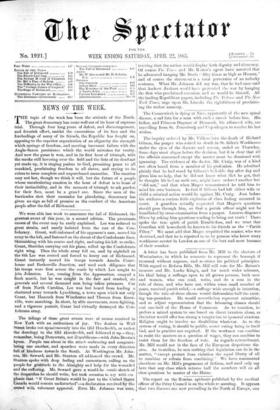The tidings of these great events were of course received
in New York with an enthusiasm of joy. The dealers in Wall Street broke out spodtsneously into the Old Hundredth, or rather the doxology to the Old Hundredth, and followed it up —they, remember, being Democrats, not Republicans—with John BroWn's hymn. People ran about in the strest embracing and congratu- lating one another, and speeches were made in _every direction full of kindness towards the South. At Washington Mr. John- son, Mr. Seward, and Mr. Stanton all addressed the crowd. Mr. Stanton spoke with deep feeling and earnestness, calling on the people for gratitude to the Almighty and help for the wounded and the suffering. Mr. Seward gave a would-be comic sketch of the despatches he should write, but took occasion to sly with em• phasis that "if Great Britain would be just to the United States Canada would remain undisturbed"—a declaration received by the crowd with vehement approval. Even Mr. Johnson was sane, trusting that the nation would display both dignity and clemency. Of course The Times and Mr. Reuter's agent have asserted that he advocated hanging Mr. Davis "fifty times as high as Haman," and of course the statement is a total perversion of an unlucky sentence. What Mr. Johnson did say was, that he had once said that Andrew Jackson would have prevented the war by hanging the first who proclaimed secession, and so would he himself. All the leading Republican papers, including The Tribune and The New York Times, urge upon Mr. Lincoln the rightfulness of proclaim- ing the widest amnesty.






























